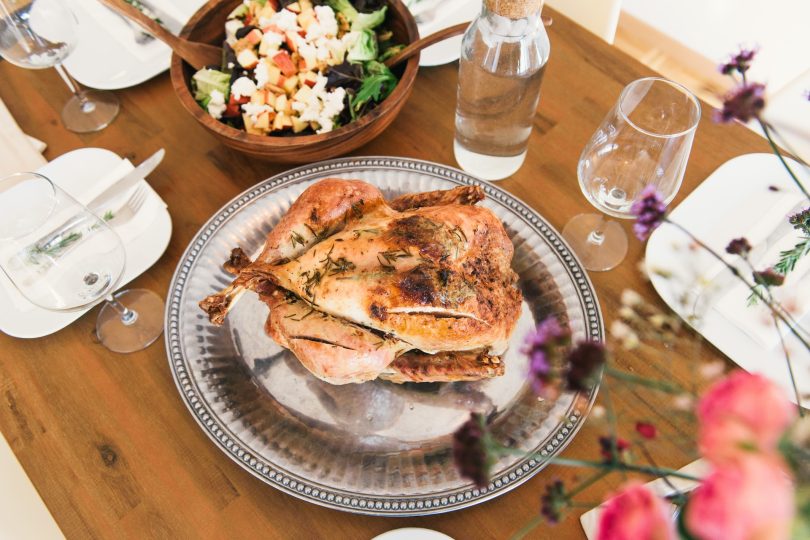When you Feel Unwell
Unfortunately, cancer doesn’t look at the calendar when it decides to appear. This means many patients are under active treatment during the holidays or are still in recovery. This also means food can often be a sore subject due to having issues with nausea, taste changes, and overall poor appetite. But that doesn’t mean you still can’t find some enjoyment during that time; it just might have to be different.
Here are a few suggestions to help navigate this time when not feeling great.
- Eat lesser amounts often. Most symptoms from cancer treatment can be helped by taking in a small amount of food every 2-3 hours instead of the standard three meals per day of larger size. The smaller amount makes it more manageable to eat if you don’t feel like eating. Eating a little over the entire day can often help with nausea as well. If you feel up to it, a few of your holiday favorites might be able to be enjoyed in an exceedingly small amount.
- Stay Hydrated. Often, we don’t remember to drink enough when we aren’t feeling well, and this can make you feel worse. Sip on beverages like water, electrolyte-infused drinks like Gatorade, or nutrition shakes like Ensure or Boost in between when you eat. This will give you more energy during the day to be alert and present for the company. The occasional holiday beverage would be fine too, just be mindful of your trigger foods. Some are more sensitive to dairy during treatment, making eggnog tricky. For others, added sugar might taste different so a sweet punch or hot chocolate may not be the best option.
- Rest when you need it. It’s okay to take naps during this time. Have a special event that evening? Plan to nap earlier in the day to make sure you can stay more awake at your gathering.
- Enjoy what you can, Freeze what you can’t. When it comes to some of our favorite holiday foods, it might be possible to save a little in the freezer to have them later when you’re feeling better. Not everything will work but treats like cookies or a sweet potato casserole are examples of dishes you can easily save to have a few weeks later when you feel more ready to enjoy it.
- Focus on the company. Still struggling with eating? Don’t shy away from gatherings just because you can’t enjoy the food. Part of our health is being social and seeing our loved ones. You can take precautions if needed with remote gatherings or wearing a mask. You should also not be shy explaining any sensitivities you have. Is smell a big issue for you? Feel free to ask your friends and family not to wear perfume or cologne or to not give you gifts with strong scents like lotion and candles. Most don’t know what you’re going through but want you to have a fun time and will do what they can to help. Enjoy their company – laugh, tell stories, catch up! You may find that being around loved ones boosts your appetite too!
When you Feel Well
Now, let’s talk about healthy eating during the holidays when you are feeling good. This could be during treatment or when you’re in survivorship. Either way, most of us are concerned about the holiday weight gain. However, according to research, most of us gain only about a pound or so around Thanksgiving and Christmas. Unfortunately – and as unfair as it might seem – those of us with a higher body mass index tend to put on more weight during the holidays, more in the range of at least a couple of pounds.
That still doesn’t sound like much – which is why it can be easy for us to allow those pounds to stick around year after year, making our holiday weight gain more significant over time.
Part of the struggle to make healthy choices this time of year is that food is such a huge part of our culture. It’s at all our gatherings with friends and family, it’s a work holiday function, and it’s part of most special events happening around the community too. Yet, there are tips that can help you make a few healthier choices to avoid putting on weight.
As a start, throw the word “diet” out the window.
One way people try to avoid the holiday weight gain is to just restrict themselves. Either by not indulging at all, or even more likely, trying to not eat at all leading up to a big event and then end up overeating in the end.
Instead of going too restrictive, try mindful eating. The holidays are a wonderful time to linger over the family meal and really think about what you’re tasting. Your first few bites are where you get the most pleasure out of food so take your time to enjoy the aroma of your meal and savor those bites. Eating mindfully will allow you to dine well on smaller portions (try using a smaller plate, it helps!), but still sample special holiday dishes.
Mindful eating also involves making good choices as you navigate the buffet or pass food around the table. Why fill yourself up with chips or mashed potatoes that you can eat any time of the year? Instead, make your guilty pleasures those foods that your family and friends prepare especially for the holidays.
Here are a few quick tips to think about to help with the holidays.
- Drink well. Sugary beverages add substantial amounts of calories with little to no nutrition. Save those calories for something more meaningful by swapping out your standard soda or punch for water. Sound boring? Fruit- and herb-infused waters are everywhere now, and it’s easy to make your own by combining orange, blueberry and basil or cinnamon, vanilla bean, and pear to a few liters of flat or sparkling water. If there is a special drink you really enjoy, like grandma’s hot chocolate, try to keep to just one cup and savor it.
- Say goodbye to stress. With all the hustle and bustle of this season, it’s easy to run to the drive-through when it’s another busy night and you have no idea what to make for dinner. It’s worth it to take even just 30 minutes (the time it would take you to go to a drive-through) and plan for your meals, whether it’s relying on your slow cooker or marinating a quick-grilled steak. Take some time, maybe on the weekend, to do some meal planning to ensure you have easy, but healthy meal options at home later in the week.
- Snack the smart way. Keeping your energy up is also important this time of year. The healthiest snacks – which also keep you satisfied until mealtime – combine a little protein and fiber. Consider almonds and a mozzarella cheese stick, peanut butter and an apple, yogurt and blueberries, or hummus and veggies.
- Spice it up. Did you know that our daily salt intake should only be a single teaspoon? Most of us eat too much salt, putting us at risk for high blood pressure and heart disease. Instead, try to cook some holiday recipes that use spices to add flavor. If you’re dining elsewhere, it’s a good rule to avoid casseroles, especially those made with canned soups: These pack a wallop of sodium.
- Head into the new year with good health. Consider using these tips throughout the entire year to help you continue to make better choices all year round.
Looking for a few recipes ideas for the holidays that are a little healthier? Check out the holiday section from the American Institute for Cancer Research. Eating Well also has a great list of quick dishes you can pull together for your weekday meals during the season.


